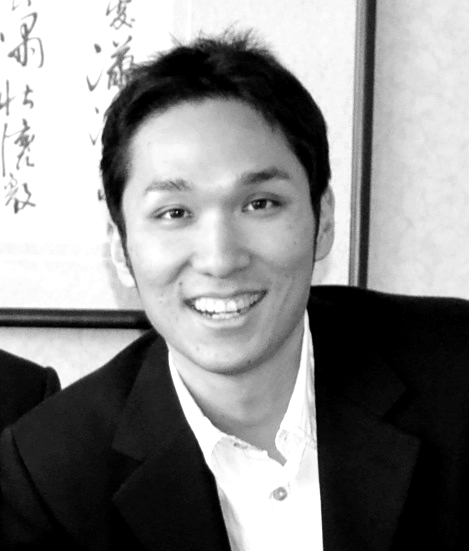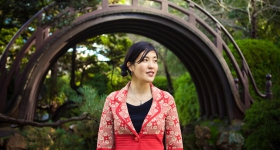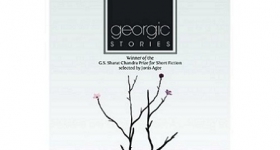Sometimes, it takes going to the far reaches of science fiction to get to the root of reality. In Peter Tieryas Liu’s first novel, Bald New World, society has disintegrated into a dystopia after a mysterious event known as Baldification leaves everyone with nary a hair on their heads.
The protagonist, filmmaker Nick Guan, is forced to fight his way back to familiarity after he and his pal Larry Chao are exposed to the dark underside of the booming wig-making industry, and the two get into plenty of misadventures involving North Korean spies, cults, and, yes, digital cricket fighters.
The story travels from China to Los Angeles, dipping in and out of Nick’s subconscious from time to time, and it is at once satirical and heartfelt. What Liu points out, however, is that tucked into the seemingly improbable series of events is a very important truth: that the American Dream is damaged but not yet dead.
“I do have a certain disillusionment, but at the same time, I know that things go in cycles,” he explains. “When you look at history, things always go in cycles. Take economics, for instance. The really bad times are followed by really good times. I think I’m disillusioned, but I’m also optimistic about the future.”
Here, Liu talks about his process, who inspires him (despite numerous comparisons, Liu says he’s avoided reading Murakami), and his theory about why people are so obsessed with the apocalypse.
Hyphen: You’ve written about post-apocalyptic worlds before in your short story collection Watering Heaven, but Bald New World expands upon that concept with an inexplicable event called Baldification. Why hair, and what inspired the story?
Liu: You see a lot of books out there about the apocalypse and what I wanted to do was write about something where something dramatic happens in the world and everyone actually just adapts. Humans just move on so quickly, and so even though I wanted to do something big and grand, I didn’t want to do something apocalyptic with zombies, you know? So that’s where I came up with the idea of baldness.
That’s something that everyone has – hair – so they’re all affected and it’s a pretty big deal, but at the same time, all the shifts are subtle. It’s a lot like cell phones. You think about how even 15, 20 years ago nobody had cell phones and now look at how fundamental they are to our lives. We don’t even talk about it.
You also allude to the American Dream a lot within BNW, and not always in the most flattering light. So what are your thoughts about it, unfettered by the sci-fi elements of the narrative, and why does it crop up so often in your works?
I always want to explore the idea of the American Dream because growing up, I was not too well-off, and I think that especially for me, it’s just a powerful thing to hold onto. When I see other cultures, I do see a lot of movement between classes, but it’s a lot more limited, a lot more stratified. Honestly, if I’d grown up as a poor kid in an Asian country, it would have been much, much harder for me to go anywhere, to have any money or mobility.
It’s also that right now, I’m seeing a lot of my friends, my colleagues, losing jobs – so it’s almost like if we don’t fight for [the American Dream], then we’re going to lose it. Thematically, Bald New World is also about getting rid of everything so that he can start over. I’m not saying that we as a country should do that, but it’s interesting to explore. I really love what America represents, and I love how it embraces all different cultures.
Titling the book Bald New World was also a bold decision, a reference to Aldous Huxley’s Brave New World. What works or writers were you inspired by in writing this, your first novel?
This is going to sound weird, but the Bible. I like that when you go back in the Bible, all those characters are so flawed. It’s kind of like, that’s what appeals to people and these are religious figures, holy figures, and regardless of what you believe, the accounting of their lives is really touching. I’m also influenced by [John Steinbeck’s] East of Eden and Melville’s Moby Dick, and Nietsche, of course. That’s on the western side. On the Chinese/Asian side, there’s Dream of the Red Chamber by Cao Xuequin and Strange Stories from a Chinese Studio by Pu Songling, [who is] often considered to be like a Chinese Kafka. With Bald New World, I went back to the epics because I wanted to do a big book.
You’ve gotten comparisons to Haruki Murakami in terms of your subject matter. Thoughts on that?
I’ve actually never read Murakami! I never read him, but after Watering Heaven came out, people were always mentioning him, so then I just actually avoided him.

The author, Peter Tieryas Liu
This is a more personal work than any of your previous short stories or pieces. What was that like, inserting more of yourself into the story, and how did you react after seeing the book in print?
It was really hard. Almost terrifying. I think it’s kind of funny because I never wanted to divulge certain aspects of my life because they’re very personal, but I felt like I wasn’t being honest if I left it out, and I really just wanted to be honest with the story. And what I originally decided to do was that I was going to put everything down and then I’d go back to it later and see if it works. Is it too melodramatic, is it too soft, is it too “oh pity me,” and does it work? But there also ended up being moments where I decided to just go all-in. Once I had the final version and I reread it, there were actually parts where – and this sounds cheesy – but there were parts where I was almost moved to tears.
So it’s terrifying but it felt like if I didn’t put it out there, it would be a loss. It sounds cheesy, but whenever I read things where people just put their whole self out there, it’s kind of like, you read it and it’s like, “Whoa, they’re willing to put themselves out there” – and after that, other writing just isn’t even worth reading anymore.
On the genre front, why do you think people are so fascinated with dystopias, and why are you so drawn to darker story lines?
That’s a really good question. I think that part of it is that in some sense, it’s easier to find meaning when you put everything in apocalyptic terms. I actually remember that from a Christianity class I took years ago back in Berkeley and one of the things that I remember from it was that in the year 999, people were freaking out and thinking that it was going to be the end of the world. It kind of reminded me of 1999 when people thought it was the end of the world. I think people are always looking for meaning outside of themselves.
One of the cult things that I love is Robocop. It was so dark and bleak when it first came out, but if you watch it now, it’s tamer than what’s happening in real life. The commercials are hyper-crazy and it’s a dystopia but I think part of the reason why people are fascinated by dystopia is that it’s kind of predicting where we’re going and it represents people’s fears. I feel like in sci-fi, we’re talking about our fears, but in a way that in any other format, would come across as preachy.
So what’s next on your to-do list?
I have a graphic novel I've been working on with an incredible artist friend, James Chiang. It's called Dr. 2 and is "a murder mystery set between Shanghai and New York that takes on a bizarre twist when they find a corpse drowned in purple blood." It's currently being repped by Judy Hansen, who also represents some of my favorite artist/writers like Gene Yang (American Born Chinese), Kazu Kabuishi, and Robert Crumb.
***
Joyce Chen is a second-generation Taiwanese American journalist and currently a first-year candidate for an MFA in Creative Nonfiction at The New School in New York City. Her writings have been published in People magazine, Los Angeles magazine and the Los Angeles Daily News.









Comments